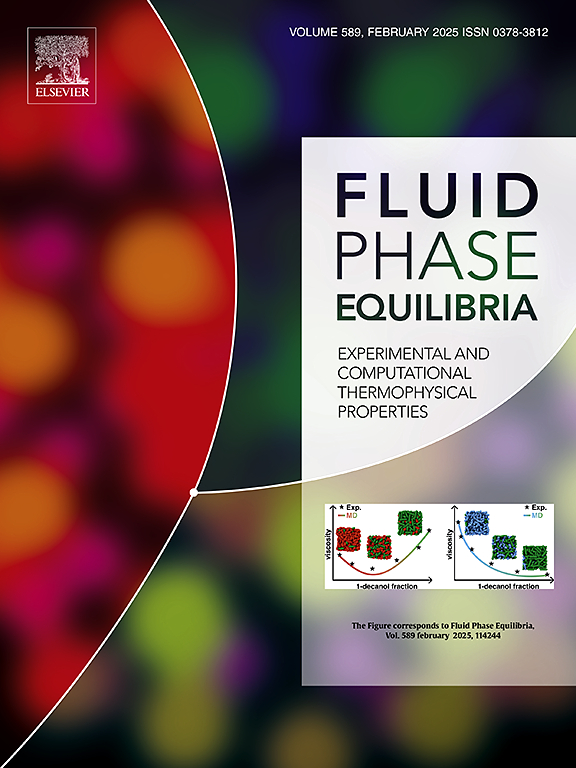Application of the significant structure theory for the viscosity modeling of ionic fluids
IF 2.8
3区 工程技术
Q3 CHEMISTRY, PHYSICAL
引用次数: 0
Abstract
The present work introduces the application of a modified significant structure theory (SST) in order to obtain improved representations of the dynamic viscosity of several representative last-generation ionic fluids: pure ionic liquids (ILs) and deep eutectic solvents (DESs). The activated-state variables present in the resulting SST-based model were related to well-known thermodynamic potentials (residual internal energy, liquid and solid molar volumes) which in turn were estimated from two simple cubic equations of state of the van der Waals type: Soave-Redlich-Kwong or Peng-Robinson. The modifications introduced to the SST approach were successfully verified during the correlation and prediction of experimental dynamic viscosities of 3 families of imidazolium-based ILs ([CXmim][BF4], [CXmim][PF6] and [CXmim][Tf2N]), one pyridinium-based IL ([b3mpy][BF4]), one pyrrolidinium-based IL ([P14][Tf2N]), one ammonium-based IL ([N1114][Tf2N]) and four ILs having nonfluorinated anions ([dmim][MeSO4], [bmim][EtSO4], [bmim][Ac] and [b3mpy][dca]) over a temperature range varying from 273.15 to 438.15 K and at pressures from 1 to 3,000 bar We also considered three archetypal choline chloride-based DESs for model validation: Reline, Ethaline and Glyceline within a temperature range varying from 293.15 to 373.15 K and at pressures from 1 to 1,000 bar
重要结构理论在离子液体粘度建模中的应用
本研究介绍了如何应用改进的重要结构理论(SST)来改进几种具有代表性的最后一代离子液体(纯离子液体(ILs)和深共晶溶剂(DESs))的动态粘度。基于 SST 的模型中的活化状态变量与众所周知的热力学势能(残余内能、液体和固体摩尔体积)有关,而这些势能又是通过两个简单的范德瓦耳斯类型立方状态方程估算出来的:Soave-Redlich-Kwong 或 Peng-Robinson 模型。在对 3 种咪唑基 IL([CXmim][BF4]、[CXmim][PF6]和[CXmim][Tf2N])的实验动态粘度进行关联和预测时,成功验证了对 SST 方法所做的修改、一种吡啶鎓基 IL([b3mpy][BF4])、一种吡咯烷鎓基 IL([P14][Tf2N])、一种铵基 IL([N1114][Tf2N])和四种具有非氟阴离子的 IL([dmim][MeSO4]、[bmim][EtSO4]、[bmim][Ac]和[b3mpy][dca]),温度范围为 273.我们还考虑了三种基于氯化胆碱的 DES 原型进行模型验证:Reline、Ethaline 和 Glyceline,温度范围为 293.15 至 373.15 K,压力范围为 1 至 1,000 bar。
本文章由计算机程序翻译,如有差异,请以英文原文为准。
求助全文
约1分钟内获得全文
求助全文
来源期刊

Fluid Phase Equilibria
工程技术-工程:化工
CiteScore
5.30
自引率
15.40%
发文量
223
审稿时长
53 days
期刊介绍:
Fluid Phase Equilibria publishes high-quality papers dealing with experimental, theoretical, and applied research related to equilibrium and transport properties of fluids, solids, and interfaces. Subjects of interest include physical/phase and chemical equilibria; equilibrium and nonequilibrium thermophysical properties; fundamental thermodynamic relations; and stability. The systems central to the journal include pure substances and mixtures of organic and inorganic materials, including polymers, biochemicals, and surfactants with sufficient characterization of composition and purity for the results to be reproduced. Alloys are of interest only when thermodynamic studies are included, purely material studies will not be considered. In all cases, authors are expected to provide physical or chemical interpretations of the results.
Experimental research can include measurements under all conditions of temperature, pressure, and composition, including critical and supercritical. Measurements are to be associated with systems and conditions of fundamental or applied interest, and may not be only a collection of routine data, such as physical property or solubility measurements at limited pressures and temperatures close to ambient, or surfactant studies focussed strictly on micellisation or micelle structure. Papers reporting common data must be accompanied by new physical insights and/or contemporary or new theory or techniques.
 求助内容:
求助内容: 应助结果提醒方式:
应助结果提醒方式:


